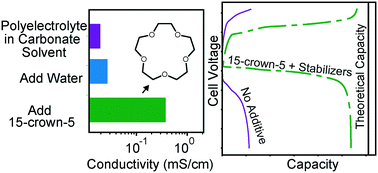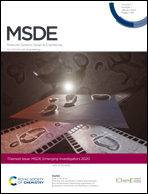Electrolyte additives to enable nonaqueous polyelectrolyte solutions for lithium ion batteries
Abstract
Nonaqueous polyelectrolyte solutions, in which a negatively charged macromolecule neutralized by lithium is dissolved in nonaqueous solvents, have shown promise as potential high transference number electrolytes. However, in battery-relevant carbonate solvents (ethylene carbonate/dimethyl carbonate blends), it has been shown that lithium ions do not readily dissociate from easily synthesized sulfonated polymers, despite the solvent's high dielectric constant (∼50). In this work, a range of additives are screened to improve conductivity, and we demonstrate that the addition of less than 5 vol% of 15-crown-5 achieves an order of magnitude conductivity increase by selectively improving lithium dissociation. Utilizing the optimized electrolyte, we show that polyelectrolyte solutions may be directly substituted for a standard electrolyte with commercial electrodes in a graphite/LiFePO4 cell, providing further motivation for future study of these new electrolytes.

- This article is part of the themed collection: MSDE Emerging Investigators 2020


 Please wait while we load your content...
Please wait while we load your content...
